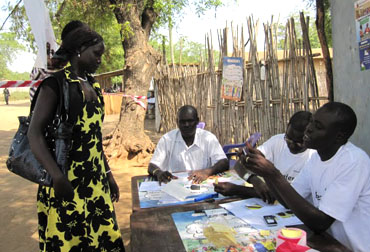
Juba, Southern Sudan — Yesterday morning, on the third day of the voter registration period in Sudan, I embarked on a wild goose chase with my Sudanese motorcycle driver in Juba, the capital of southern Sudan. Isa, my motorcycle driver, and I asked anyone who would speak with us if they knew where we could find a nearby voter registration center. Our search took us from Juba’s main cultural center to two different primary schools, to a police station and eventually, to a shaded roadside registration center in the Hai Nyakama neighborhood, near Juba University.
The registration center was demarcated by red and white plastic tape bordering the table where would-be voters were registering. A “Register to Vote” sign hung in front of the table, where three men sat and waited for people to come register. When I arrived, a woman was presenting her ID card, one of the officials was writing her information in the registration book, and another was giving her a laminated stub that she will need to take with her to the polling station during the election period in April.
Martin, one of the three registration officials at this center, told me that “we are having problems registering women. This lady here is only the third this morning.” By 10:30 a.m., about 50 people had registered. As I sat with Martin, another five men showed up, including a police officer, who asked if he was allowed to vote in the elections. The registration officials were very clear and helpful in answering questions from would-be voters. “The issue is that you must register to vote in the same place where you have registered,” one of the officials said to the police officer, who was from neighboring Eastern Equatoria state but works in Juba.
Martin noted that there is a need for more media attention and efforts to inform women that they have the right to vote. He said that initially only Juba radio (an AM station) was making announcements about registration, but in the past day he has also heard information broadcast on the U.N.’s Radio Miraya and on other FM stations such as Liberty and Bakhita. He also said that the center where he worked did not open as scheduled on November 1, because he and his fellow registration officials were not trained in the registration process until that day; the center opened yesterday on, November 2.
Overall, Martin seemed to hope that more people would turn up to register as the word spread in Juba about the process. There are two constituencies in the city, Juba East and Juba West, and four registration centers per constituency (this is not the case in some states, where there are only two centers per constituency), so he thinks that people will find their way to these centers.
Despite the fact that my morning-long search to find a center did end in success, I am left wondering how the registration process in extremely rural and remote areas of southern Sudan is going. As the leader of a prominent women’s group in Juba told me yesterday, “I have no idea where I am supposed to register [in Juba], and I am a well-educated woman. Just imagine what it must be like for my sisters who are illiterate and living in villages far from the state capitals.”
Voter registration is just one of many issues that the semi-autonomous Government of Southern Sudan must juggle at this moment. Insecurity ripples through the already tense states along the North-South border, and new rounds of inter-ethnic fighting reportedly occurred over the weekend in Unity and Upper Nile states, forcing the temporary suspension of voter registration in the affected counties before it even began.

